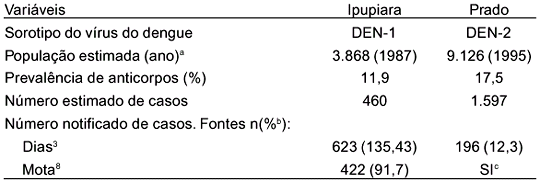Serologic studies in Brazil have indicated a 25% to 56% prevalence of dengue virus infections. However, these studies were carried out in populations of middle-sized and larger cities. The present study describes two epidemics of classic dengue fever in two small cities in the State of Bahia. The first occurred in 1987, in Ipupiara and was caused by dengue serotype-1 (DEN-1), the second occurred in 1995, in Prado and was caused by dengue serotype-2 (DEN-2). The laboratory diagnosis was made by the hemagglutination-inhibitation test. 461 serum samples were collected in 1995 in Ipupiara (district of Chapada Diamantina) out of a population of 3,868 and 228 samples out of a total of 9,126 inhabitants of Prado (in the Southernmost coastal region). The seropositivity of the samples was 11.9% (55/461) in Ipupiara and 17.5% (40/228) in Prado. These were no statistically significant differences as to age and sex between seropositive and seronegative individuals of the two cities studied. However, the seropositive cases in Ipupiara indicated a higher percentage (15.9% vs. 9.3%) of residency in or travel to other states of Brazil (p<0.03). Based on these data we estimate the occurrence of 460 and 1,597 cases of infection in Ipupiara and Prado, respectively. In conclusion, dengue virus infections in smaller cities probably have singular characteristics, since they exhibit a lesser prevalence of seropositivity caused by decreased breeding possibilities of Aedes aegypti.
Dengue; Outbreak; Serology survey; Bahia State



